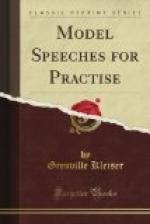That it is the stubborn defender of liberty, let our own annals answer, for America sprang from the defense of English liberty in English colonies, by men of English blood, who still proudly speak the English language, cherish English traditions, and share of right, and as their own, the ancient glory of England.
No English-speaking people could, if it would, escape its distinctive name, and, since Greece and Judea, no name has the same worth and honor among men. We Americans may flout England a hundred times. We may oppose her opinions with reason, we may think her views unsound, her policy unwise; but from what country would the most American of Americans prefer to have derived the characteristic impulse of American development and civilization rather than England? What language would we rather speak than the tongue of Shakespeare and Hampden, of the Pilgrims and King James’s version? What yachts, as a tribute to ourselves upon their own element, would we rather outsail than English yachts? In what national life, modes of thought, standards and estimates of character and achievement do we find our own so perfectly reflected as in the English House of Commons, in English counting-rooms and workshops, and in English homes?
No doubt the original stock has been essentially modified in the younger branch. The American, as he looks across the sea, to what Hawthorne happily called “Our old home,” and contemplates himself, is disposed to murmur: “Out of the eater shall come forth meat and out of the strength shall come forth sweetness.” He left England a Puritan iconoclast; he has developed in Church and State into a constitutional reformer. He came hither a knotted club; he has been transformed into a Damascus blade. He seized and tamed a continent with a hand of iron; he civilizes and controls it with a touch of velvet. No music is so sweet to his ear as the sound of the common-school bell; no principle so dear to his heart as the equal rights of all men; no vision so entrancing to his hope as those rights universally secured.
This is the Yankee; this is the younger branch; but a branch of no base or brittle fiber, but of the tough old English oak, which has weathered triumphantly the tempest of a thousand years. It is a noble contention whether the younger or the elder branch has further advanced the frontiers of liberty, but it is unquestionable that liberty, as we understand it on both sides of the sea, is an English tradition; we inherit it, we possess it, we transmit it, under forms peculiar to the English race. It is as Mr. Chamberlain has said, liberty under law. It is liberty, not license; civilization, not barbarism; it is liberty clad in the celestial robe of law, because law is the only authoritative expression of the will of the people, representative government, trial by jury, habeas corpus, freedom of speech and of the press—why, Mr. Chairman, they are the family heirlooms, the family diamonds, and they go wherever in the wide world go the family name and language and tradition.




